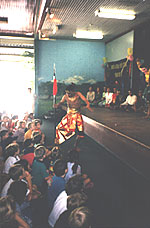
MAJOR ACTIVITIES
Media Program | Youth and sport | Visual and performing arts and arts heritage | Professions and science and technology | Indonesian language and culture studies | Australian culture and English language studies | Civil Society Program
INDONESIAN LANGUAGE AND CULTURE STUDIES
The Institute aims to improve the quality of teaching of Indonesian language and culture studies in Australian schools, thus enhancing knowledge and understanding of Indonesia in Australia.
Indonesian in-country studies
During the period from 1995 to 1999 the Institute supported the development of the Australian Consortium for In-Country Indonesian Studies (ACICIS) to assist Australian university students to undertake a range of tertiary-level one and two semester programs of Indonesian language and cultural studies in Indonesia in collaboration with Indonesian universities. ACICIS is a non-profit educational consortium with a secretariat located at Murdoch University, WA. All major Australian tertiary education institutions with an Indonesian Studies focus are members of ACICIS. The ACICIS consortium is recognised under a trilateral Letter of Agreement with the University Mobility in Asia and Pacific (UMAP) scheme and the Indonesian Department of Education and Culture. In September 1999 the consortium supported 66 students undertaking government, business and community relevant courses in Gadjah Mada University in Yogyakarta or at Muhammadiyah University in Malang, East Java. Twenty-five of these students chose to continue for a second semester, and 34 new applications were received in May 1999 for second semester, taking the total number of students placed in Indonesia since ACICIS' inception to
over 350 students. The web site for the project is wwwsshe.murdoch.edu.au/acicis/.
The Consortium Director was Professor David T Hill, and the in-country Director was Associate Professor David Reeve.
Indonesia web site
The Curriculum Corporation and Asia-Education Foundation commenced development of an Indonesia web site in April 1999. The web site will provide a complete primary and secondary education focus for Indonesian Studies covering studies of society and environment, mathematics and science, education and arts. The development of curriculum guides and classroom resources for teachers was to be completed by October 1999. A rich variety of teaching and learning activities are provided which draw on an extensive range of web resources. The teacher section was available on 30 November 1999 at: www.curriculum.edu.au/accessasia/indonesia.
The second stage of the project develops a student component of the web site that will provide interactive learning experiences for primary and secondary students. This section of the web site will be available in April 2000. The third stage will link Indonesian language studies and cultural studies, including a broad range of language resources written by the Curriculum Corporation and other education publishers. The project is planned for completion at the end of 2000. The developers can be contacted by e-mail at pam@curriculum.edu.au.
Indonesian language and culture scholarships for Australian teachers
Teacher scholarships, administered by State education departments/ministries and by the independent and Catholic education authorities, continued to be awarded to train Australian teachers of Indonesian language and cultural studies to enable further study in Indonesia (including in history, politics, economics, geography, art, music and drama). This program supported public and private education systems to send teachers of Indonesian language and culture to Indonesia for intensive language and cultural courses at accredited training institutions. Over the four-year reporting period 128 Australian teachers were assisted to improve their Bahasa skills. During the ten years of the teachers scholarship program, close to 350 Australian teachers were trained in Bahasa.
|
The Board chose to defer the 1999 scholarship program and expects to launch a reinvigorated program in 2000, possibly in the form of an AII Professional Development Program. This decision was taken in recognition of the changes in the Australian education system relating to the need for teachers of Bahasa in Australia and in support of the National Asian Languages and Studies in Australian Schools (NALSAS) Strategy 1995-1998. That strategy targets four Asian languages - Indonesian, Chinese (Mandarin), Japanese and Korean - for priority in Australian schools through until 2006. |

Teacher scholarship recipient Ms Rebecca Peake in the classroom 1997. |
Student subsidy scheme
The Institute continued its undergraduate student subsidy scheme for Australian students who undertook a unit of study in Indonesia for academic credit. Under the program students undertook units that required fieldwork in Indonesia, including in science, veterinary science, medicine, nursing, business studies, aeronautical engineering, journalism and media studies. During 1995 beneficiary institutions included the Royal Darwin Hospital Campus, Batchelor College, the Tasmanian School of Nursing and the School of Resources at the University of Canberra. In 1996-97 the University of Queensland and the University of Western Sydney joined Batchelor College in the Northern Territory for support and in 1997-98 students from the University of Western Australia and the University of South Australia also received subsidies. In 1998 and 1999, the Board decided to defer the program because of security considerations.
Australia Indonesia Rural Areas Education Scheme (AIRAES)
Between 1995-99, the Institute funded the Australia Indonesia Rural Areas Education Scheme (AIRAES). The program established and expanded links between rural schools, teacher training institutions and rural students. It provided Indonesian and Australian teachers with an opportunity to experience the other country's rural education system, community and society, through funding an Australian tertiary institution with a rural campus to run a teacher exchange program. The institutional linkages strengthened by the program included:
- Sturt University and the Western Region of NSW Department of School Education with the Institut Keguruan dan Ilmu Pendidikan (IKIP) - Institute of Teaching and Education in Yogyakarta (1995-96).
- La Trobe University, Bendigo and schools from the Loddon Campaspe-Mallee Region of Victoria with the Institut Keguruan dan Ilmu Pendidikan (IKIP), Ujung Pandang, Sulawesi Selatan (1996-97).
- School of Early Childhood and Primary Education, University of Tasmania with the Institut Keguruan dan Ilmu Pendidikan (IKIP), Padang, West Sumatra (1997-99).
Other projects
|
Indonesian participants from the student exchange program (AIYEP) perform at a Darwin school in 1998. |
|
